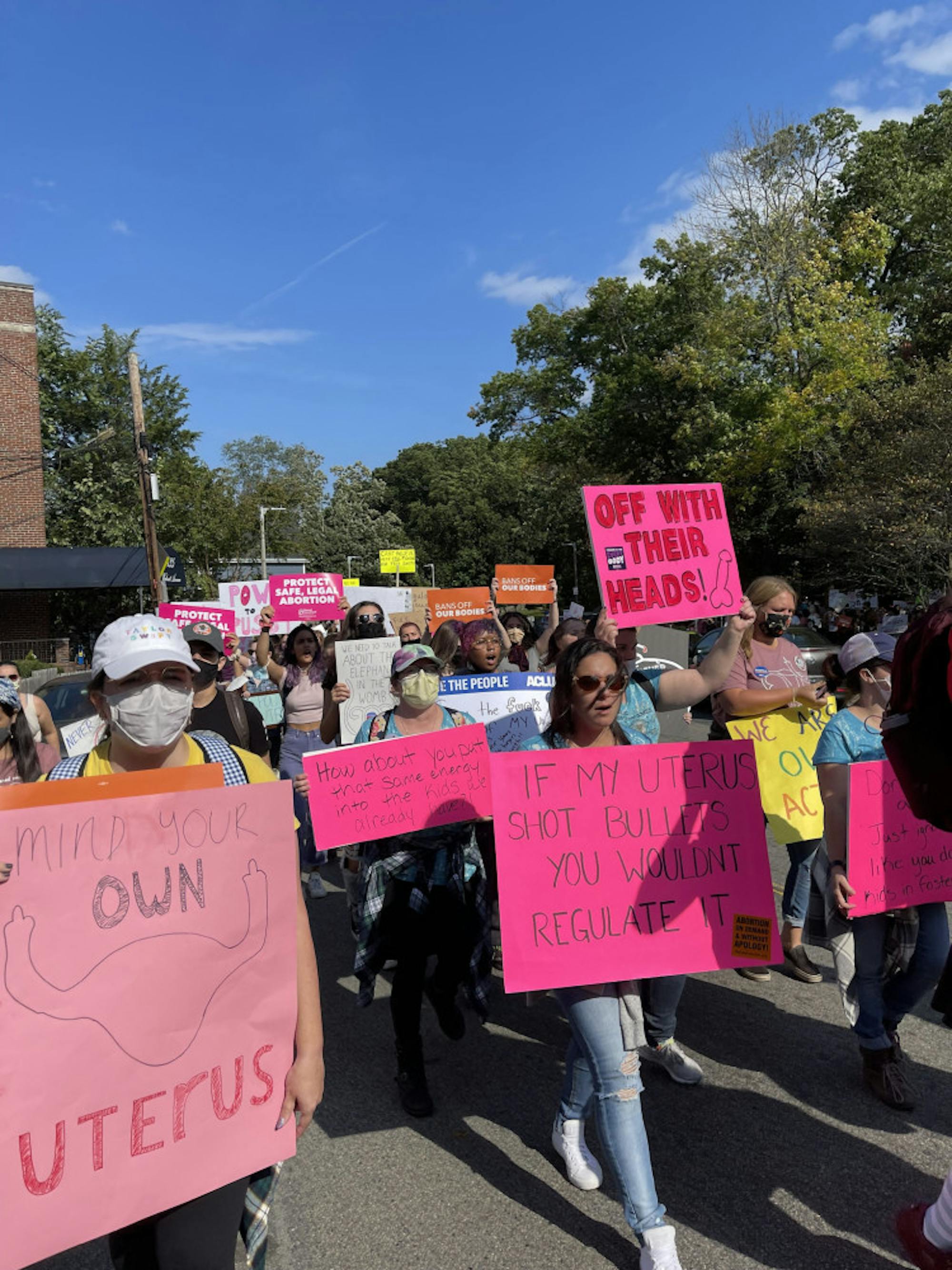“We won’t go back! We will fight back!” the crowd chanted on Oct. 2 at the Franklin Park Playstead in Boston. At 12 p.m., thousands gathered as part of a nationwide rally focused on the fight for reproductive rights.
This national rally was held just days before the U.S. Supreme Court began a new session that included a direct challenge to the Texas Heartbeat Act, or Senate Bill 8, a law that came into effect Sept. 1. This law prohibits abortions after a fetal heartbeat is detected, which is usually after six weeks of pregnancy. There are no exceptions for rape or incest. It also allows people to sue abortion providers and anyone who helps others obtain an abortion.
The bill has raised many angered discussions and brought up questions in regard to the 1973 Roe v. Wade case. This case is seen as a landmark case for reproductive rights in the United States. The case ruled protection for women to have the freedom to decide to undergo an abortion without any government limitations.
Many Americans across the country joined together to demonstrate against the Supreme Court’s rejection of an emergency request to block Texas’s abortion ban.
Junior Chelsea Wong, a community health major, discussed the widespread impact of the march.
"It's really cool that it's such a national [event]," Wong said. "Even though the abortion laws are going on in Texas, it's reverberating around the country."
A coalition of organizations, including Women’s March, the American Civil Liberties Union, National Abortion Rights Action League Pro-Choice Massachusetts and the Planned Parenthood Advocacy Fund of Massachusetts, joined together to organize the rally at Franklin Park. These organizations focus on reproductive health, women’s rights and general health care.
The event was headlined by several notable speakers, including political figures such as Massachusetts Senator Ed Markey, Congresswoman from Massachusetts’ Seventh district Ayanna Pressley and Attorney General Maura Healey.
In her speech, Pressley spoke about a person's right and choice to abortion.
"Abortion care is health care," Pressley said.
Markey spoke in a similar tone, speaking against the Texas abortion law and for more progressive laws.
“We must pass my legislation to expand the Supreme Court by four seats so that we can restore balance and justice of the Supreme Court,” Markey said. “We need to abolish the filibuster so we can pass the progressive laws we need in this country."
Many protestors held up signs during the rally. Some signs read, “Keep abortion safe and legal,” “Reproductive rights are foundational for women’s freedom” or “Abortion saves lives.” Other signs were more personal, such as “I’m alive thanks to safe, legal and accessible abortion.” Many signs played on words like, “We need to talk about the elephant in the womb,” or “Mind your own uterus.”
Since the national rally on Oct. 2, a federal judge, Robert L. Pitman, blocked the Texas anti-abortion law on Oct. 6. The law was reinstated by an appeals court on Oct. 8. Ultimately, the law was upheld by the United States Court of Appeals for the Fifth Circuit on Oct. 14, keeping the law in place.
This December, the U.S. Supreme Court will hear a case challenging a Mississippi abortion law that bans most abortions after 15 weeks. This will be a direct challenge to the landmark Roe v. Wade case most likely setting the tone for the future of reproductive rights in the United States.
The issue of abortion and the current protests against Senate Bill 8 are also supported by Tufts students. Sophomore Eliyah Lister, who is majoring in community health, explained her stance on reproductive health and how her studies at Tufts contribute to it.
“I completely support [fighting for reproductive rights] 100%," Lister said. "I think community health focuses on ... getting services to people who wouldn't usually have access to them which is very important to me."
Lister, a D.C. native, grew up in a politically active environment. She frequently took part in marches along with friends and family. One of them was the women's march in January 2017 protesting the inauguration of former President Donald Trump.
“I think it is very important to be fighting for the rights of the people who live in this country," Lister said. "It is something that needs to be kept up, especially momentum-wise, and because very often women’s voices are pushed out."
Wong believes the national support for reproductive rights is important as well; however, she is unsure of the effectiveness of a protest.
“[Protests] bring a lot of attention and awareness to the cause, but I think it is more of a statement having people come together to stand up ... for what they believe in," Wong said. "It is hard [to be heard] when you’re trying to reach such a high-up government.”
Lister and Wong both expressed that they felt like many of their peers were against the abortion ban, yet Lister was unsure if how much of a priority it was to them.
"I know the majority of people at Tufts support abortion rights, but I am sure there are also people who don’t," Lister said. "Although it is an extremely important issue, I don’t know if [reproductive rights] is necessarily the top priority at Tufts."
However, Lister noted that the Tufts community is good at educating students on the intersectionality of issues.
"There is a lot of sex-positive information and a lot of [LGBTQ] action … All of that action is extremely important tied into reproductive rights," Lister said. "The intersectionality of trying supporting multiple causes is very important in order to pursue any cause that you’re [fighting] for. You can’t support reproductive rights without also supporting LGBTQ+ folks."
Wong said she feels grateful to be surrounded by the Tufts community.
"A lot of people care about this issue," Wong said. "We are fortunate that we are in a community that is so open."






